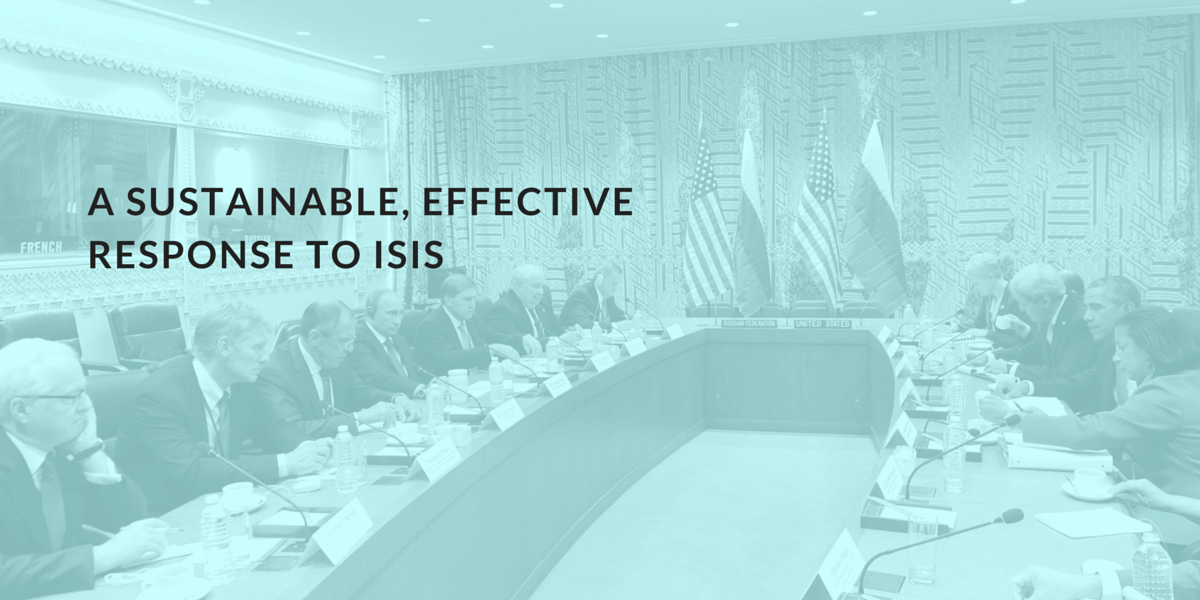Alternatives to Endless War

Last Updated on April 5, 2016.
Click here to view and download as a pdf.
There is no military solution to the ISIS crisis. The U.S. has spent over $8.8 billion conducting 10,000 military strikes in Syria and Iraq over the past 20 months, but the threat from ISIS in the region remains formidable. Instead of pursuing the illusion of military solutions, the U.S. and its allies should prioritize political solutions. Below are examples of the many alternatives available.
In the Short Term:
- Stop bombing Syria and Iraq, which aids ISIS’s efforts to recruit fighters.
- Say no to a no-fly zone. Imposing a no-fly zone is an act of war. As then-Defense Secretary Robert Gates said, a no-fly zone “begins with an attack … to destroy the air defenses.” In Syria, that means waging war against the Syrian regime by bombing Syria’s anti-aircraft system and risking war with Iran and Russia.
- Cut off funding for ISIS. ISIS is one of the wealthiest militant groups in the world, financed by stolen oil, ransom payments, black market sales of ancient artifacts, and funds from private supporters in the region. The UN resolution to block sources of funding for ISIS represents one step forward in this effort.
- Increase and better allocate funds to UN agencies working to address the humanitarian and refugee crises in the region and around the world. The U.S. Congress should support proposals to resettle 100,000 Syrian refugees in the U.S. in FY 2017.
- Commit to “no boots on the ground,” withdraw U.S. troops, trainers, and advisors from Syria and Iraq, and resist pressure to send U.S. troops to Libya.
Now and Over the Medium Term:
- Build upon the recent cessation of hostilities agreement to de-escalate the conflict. The negotiated pause represents an important first step and has allowed humanitarian assistance to reach hundreds of thousands of civilians.
- Impose a regional arms embargo against all armed actors in Iraq and Syria. The U.S., Saudi Arabia, Qatar, Jordan, Turkey, and Kuwait have provided military assistance to the armed opposition. Russia, Iran, Iraq, and Hezbollah have provided military assistance to the Syrian regime. Individuals in these countries have provided funding for a range of governmental and non-governmental militias and armed groups in Iraq and Syria. The U.S. continues to provide weapons to Iraqi security forces and Syrian rebels, many of those weapons have been used to commit gross violations of human rights, and some of these weapons have ended up in the hands of ISIS and other extremist forces.
- Strengthen financial sanctions against armed actors in the region by working through the United Nations. The UN Security Council has imposed some initial sanctions against ISIS, but these measures have not been effectively implemented. A greater commitment is needed to enforce compliance with existing sanctions and establish greater authority for stronger measures, including pressure on oil companies to identify and refuse to buy or sale ISIS oil.
- Pressure regional states to stop the flow of foreign fighters into Iraq and Syria.
Now and Over the Long Term:
- Work for an UN-led political settlement to the crisis in Iraq and Syria. Negotiations must include the major parties to the conflict as well as outside parties involved in the war, such as Saudi Arabia, Turkey, Iran, and Russia. All parties should also ensure that women’s voices are included at the negotiating table.
- Build regional stability and security through aid for refugee host nation communities to bolster stressed health, education, housing, and infrastructure sectors, and to encourage job creation.
- Work to change the political environment in both Iraq and Syria to eliminate sectarian government repression that leads some to identify ISIS and other armed militias as a lesser evil. That includes engaging in strategic outreach to all communities as well as pressuring those governments to address political and economic grievances and undermine political support for ISIS and other extremist groups.
- Support civil society efforts in both Syria and Iraq to build peace, reconciliation, and nonviolent resistance at the community level.

